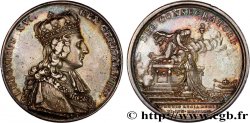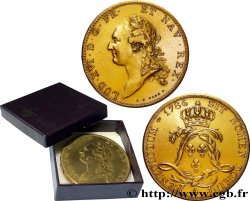fme_935363 - LOUIS XVI Médaille dénonçant la mort du roi le 21 janvier 1793
60.00 €(Approx. 68.40$ | 51.60£)
Quantity
Add to your cart

Type : Médaille dénonçant la mort du roi le 21 janvier 1793
Date: (1794)
Date: (1793)
Metal : bronze
Diameter : 31 mm
Orientation dies : 12 h.
Weight : 11,70 g.
Edge : lisse
Puncheon : sans poinçon
Coments on the condition:
Patine hétérogène avec des traces d’usure, coups et rayures. Reliefs un peu mou
Catalogue references :
Obverse
Obverse legend : LOUIS XVI ROI DE FR. IMMOLÉ PAR LES FACTIEUX.
Obverse description : Tête laurée (couronne de Cyprès) de Louis XVI à droite, un bandeau noué dans les cheveux.
Reverse
Reverse legend : PLEURÉS ET VENGÉS - LE ! ; À L'EXERGUE EN DEUX LIGNES : LE XXI IANVIER/ MDCCXCIII.
Reverse description : La France assise de face, pleurant sur une urne, contenant les restes du roi, inscrite LOUIS/ XVI ; elle pointe la main droite sur LA - LOI déchirée, une couronne renversée, des piques et une hallebarde couchées. Au-dessus de la scène, un éclair sortant d'un nuage allume l'urne qui s'enflamme d'un cœur navré.
Commentary
Une série de six jetons fut réalisée à partir de 1794 et jusqu'à 1796 pour commémorer la mort de : Louis XVI (21 janvier 1793) (Hennin 469) ; Marie-Antoinette, le 16 octobre 1793 (Hennin 536) ; Philippe Égalité, duc d'Orléans, le 6 novembre 1793 (Hennin 550) ; Madame Élisabeth, guillotinée le 10 mai 1794 (Hennin 621) ; les enfants de Louis XVI (Hennin 644) ; la mort de Louis XVII au temple le 8 juin 1795 (Hennin 695). Ces jetons ou médailles de souvenir furent extrêmement répandus en Allemagne dans leur version populaire en laiton.
La symbolique de la pique et du faisceau délié est une réponse directe à la symbolique révolutionnaire du faisceau comme garant de l'Unité.
La symbolique de la pique et du faisceau délié est une réponse directe à la symbolique révolutionnaire du faisceau comme garant de l'Unité.








 Report a mistake
Report a mistake Print the page
Print the page Share my selection
Share my selection Ask a question
Ask a question Consign / sell
Consign / sell
 Full data
Full data









